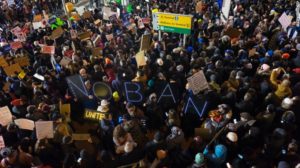By Katherine Coble || News Editor

Donald Trump’s executive order, entitled “Protecting the Nation from Foreign Terrorist Entry into the United States,” has been the subject of massive controversy since it was signed on January 27. The order reduces the number of refugees allowed to enter the country in 2017 to 50,000, suspends the country’s refugee program for 120 days, and indefinitely suspends the entrance of Syrian refugees into America. It also suspends the entry of people from Iran, Iraq, Libya, Somalia, Sudan, Syria and Yemen.
Supporters of the order say that it will keep America safe from terrorism and fits with Trump’s numerous campaign promises to “suspend immigration from terror-prone regions,” as he promised in his 100-Day Action Plan shortly following his election. Critics, including the Democratic party, the Catholic church, and the United States have condemned the order for its treatment of refugees and the potential for religious discrimination because the seven impacted countries are Muslim-majority and Trump has repeatedly said refugees from religious minority groups will receive preferential treatment. The order was also criticized from within the Republican party, with figures such as John McCain condemning the lack of consultation and forewarning given to relevant federal agencies.
The travel ban immediately caused chaos and confusion in airports as border officials struggled with how to best enforce the dramatic change in foreign policy. Legal challenges were immediately made to the order. On January 30, the states of Washington and Minnesota became among the first states to file a lawsuit against Trump, alleging that his order violates aspects of the Constitution and several federal acts including the Immigration and Nationality Act. Their challenge of the ban was supported by 17 states and the District of Columbia. On February 3, Federal judge James L. Robart (an appointee of George W. Bush) granted a temporary restraining order which effectively prevented the travel ban from being enforced. Trump did not take kindly to the judge’s decision and opted to share his opinion on Twitter, calling Robart a “so-called judge” and vowing to have the restraining order overturned. Indeed, the federal government immediately appealed Judge Robart’s decision and it was sent to the U.S. Court of Appeals for the Ninth Circuit.
The two sides began their oral arguments on February 7 for a panel of three judges that will determine whether or not to uphold or strike down Robart’s restraining order. Attorneys August Flentje and Edwin Kneedler represented the federal government in defense of the travel ban while Washington Solicitor General Noah Purcell represented the states of Washington and Minnesota. The judges seemed skeptical of the federal government’s argument that the seven majority-Muslim countries posed an actual threat to the security of the nation. According to The Economist, Mr. Flentje’s presentation for the federal government to the panel of judges faced so much resistance that he said “I’m not sure I’m convincing the court” and then switched approaches. By contrast, Solicitor General Purcell’s primarily criticism by the judges focused on his argument that Trump’s travel ban targets Muslims when only an estimated 15% of the world’s Muslim population would be banned under the executive order. Indonesia, Pakistan, and India, the top three countries with the most Muslim citizens, are not impacted.
The Ninth Circuit Court’s decision arrived on the evening of February 9, with all three judges siding in favor of Washington and upholding Robart’s order. President Trump immediately tweeted his anger at the decision, saying “SEE YOU IN COURT, THE SECURITY OF OUR NATION IS AT STAKE!”. It is expected that Trump will appeal to the Supreme Court, which remains shorthanded in the wake of Antonin Scalia’s death. In the case of a 4-4 tie, the ruling of the Ninth Circuit Court would be upheld. For now, all Trump and his opponents can do is wait and see.
First-year Katherine Coble is the News Editor. Her email is kcoble@fandm.edu.